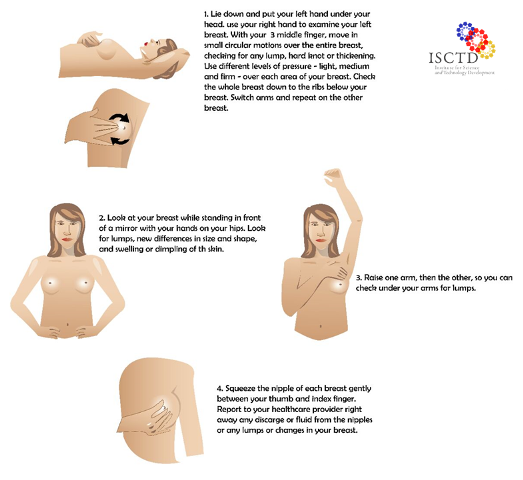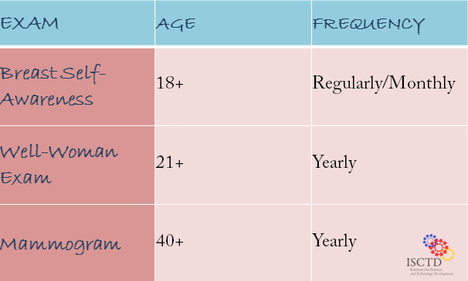October is Breast Cancer Awareness month and I felt I should contribute this article to help teach at least in a little way. As a doctor, I really want to enlighten not frighten, but firstly I would like to give you a quick definition of what Cancer is.
What is Cancer?
It's a disease that is caused by unusual replication of abnormal cells in a part of the body. There are different causes that lead to this unusual replication of cells (carcinogenesis). For example, exposure to radiation (sunlight), genetics, air quality, smoking, etc.
Breast Cancer is the unusual division of Breast cells. Although this cannot be prevented, early detection provides the best possibility for a successful treatment.
It's a disease that is caused by unusual replication of abnormal cells in a part of the body. There are different causes that lead to this unusual replication of cells (carcinogenesis). For example, exposure to radiation (sunlight), genetics, air quality, smoking, etc.
Breast Cancer is the unusual division of Breast cells. Although this cannot be prevented, early detection provides the best possibility for a successful treatment.
In Sub Saharan Africa, breast cancer is makeup one in four diagnosed cancers and one in five cancer related deaths in women. Majority of cancers in Africa are diagnosed at an already advanced stage of the disease. This is common in those parts of the world due to lack of screening and early detection services. In addition, there is limited awareness of early signs and symptoms of cancer among the public and health care providers. Stigma associated with a diagnosis of cancer also plays a role in late stage presentation in most parts of Africa.
Like I earlier stated, early detection gives you your best chance at successfully managing and eventually fighting off this disease. Early detection means finding the Cancer before it spreads to other parts of the body. By following these 3 Steps, you will help increase your chance of detecting cancer early.
Like I earlier stated, early detection gives you your best chance at successfully managing and eventually fighting off this disease. Early detection means finding the Cancer before it spreads to other parts of the body. By following these 3 Steps, you will help increase your chance of detecting cancer early.
1) Breast Self Awareness: Breast Self Awareness helps you to become familiar with how your Breast normally feels and look. Knowing this will help you identify any changes in your breast, if you notice any changes make sure you report it to your physician promptly, but do not panic 8 out 10 lumps are not cancerous.
Changes to look out for include:
• A lump or thickening in or near the breast or in the underarm.
• A change in the size or shape of the breast
• Dimpling or puckering in the Skin of the breast
• A nipples turned inward towards the breast
• Discharge (fluid) from the nipple when you aren't breastfeeding
• Scaly, red, or swollen skin on the breast, nipple or areola (the dark area of skin at the center of the breast).
Often these symptoms are not due to cancer, but if you notice any changes in your body, it's advisable to see your physician immediately so that a proper diagnosis can be conducted.
Changes to look out for include:
• A lump or thickening in or near the breast or in the underarm.
• A change in the size or shape of the breast
• Dimpling or puckering in the Skin of the breast
• A nipples turned inward towards the breast
• Discharge (fluid) from the nipple when you aren't breastfeeding
• Scaly, red, or swollen skin on the breast, nipple or areola (the dark area of skin at the center of the breast).
Often these symptoms are not due to cancer, but if you notice any changes in your body, it's advisable to see your physician immediately so that a proper diagnosis can be conducted.
2) Well-Woman Exam; It is recommended that women visit their family physician or gynecologist each year for an annual Well-Woman Exam. In addition to a routine pelvic exam and Pap smear the doctor may perform a brief breast exam to check for abnormalities.
The well-woman exam is a great opportunity for you to discuss with your physician any questions or concerns you have regarding your breast health, for example your doctor may help you determine the most appropriate frequency for your early detection steps.
The well-woman exam is a great opportunity for you to discuss with your physician any questions or concerns you have regarding your breast health, for example your doctor may help you determine the most appropriate frequency for your early detection steps.
3) Mammogram: In its early stages, breast cancer does not usually cause symptoms. The National Breast Cancer Foundation recommends that women ages 40 & older get a mammogram every year. A mammogram is an X-Ray of the breast; it is a safe way to detect cancerous tumors and other abnormal conditions. Women who have screening mammograms have lower chance of dying from breast cancer than women who do not have screening mammograms.
Mammograms can detect cancer or other problems before a lump becomes large enough to be detectable to touch. They provide an effective way to find breast cancer in its early stages when treatment is usually the most successful, considered safe, quick and relatively painless.
When breast cancer is detected early (localized stage) the 5 year relative survival rate is almost 100%, this is why it is so important for you to schedule regular exams.
Mammograms can detect cancer or other problems before a lump becomes large enough to be detectable to touch. They provide an effective way to find breast cancer in its early stages when treatment is usually the most successful, considered safe, quick and relatively painless.
When breast cancer is detected early (localized stage) the 5 year relative survival rate is almost 100%, this is why it is so important for you to schedule regular exams.
Please discuss with your physician on how often you should have breast exams. Women with a first degree relative who has been diagnosed with breast cancer (parent, sibling, and child) may need to begin mammography earlier and should consult their physician about the timing and frequency of the exams.
Categories
All
Activity
Advancement
Africa
Business
Change
Health
Health Information
Research
Technology
Travel
This article is published under the Health Information Campaign of the HEDProject group. Please consider being a sponsor and donor to allow the group improve their reach, disseminate more information in the region we operate and provide the needed facilities for care and teaching.




 RSS Feed
RSS Feed
